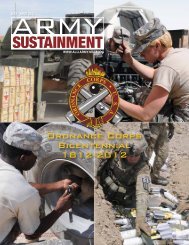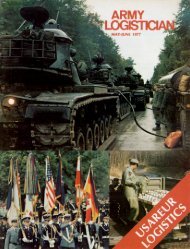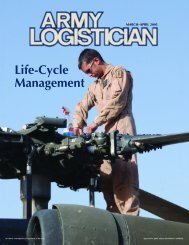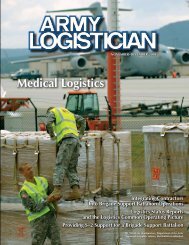Do Stryker Brigade Combat Teams Need Forward Support ...
Do Stryker Brigade Combat Teams Need Forward Support ...
Do Stryker Brigade Combat Teams Need Forward Support ...
You also want an ePaper? Increase the reach of your titles
YUMPU automatically turns print PDFs into web optimized ePapers that Google loves.
supply unit or a regional supply unit. Both of these<br />
units are static, not designed to go anywhere. Regional<br />
supply units tend to provide equipment, while garrison<br />
supply units tend to provide supplies. Larger units<br />
have an internal supply platoon. Unlike the U.S. Army,<br />
the Iraqi Army has no field supply units to run supplies<br />
to tactical units. Internal support platoons have nothing<br />
to hook into if their unit is in the field for a long<br />
time or out of their usual operating area.<br />
Another time, a convoy was<br />
attacked and reported its<br />
location incorrectly. After<br />
that attack, the Iraqis realized<br />
the importance of knowing<br />
where they were on the map,<br />
something they had not quite<br />
grasped before.<br />
The Iraqi Army is facing a severe maintenance crisis.<br />
Since it received all of its equipment at the same<br />
time, all of the maintenance services are due at the<br />
same time and all of the same parts seem to be wearing<br />
out at the same time. Thus, all of the equipment will<br />
need to be replaced or fixed simultaneously.<br />
Right now, the Iraqi Army is facing several brewing<br />
supply problems. All Iraqi units suffer from a lack of<br />
class IX (repair parts) for their U.S. vehicles. Class<br />
IX problems once threatened to stop the Iraqi unit<br />
I worked with completely. Our unit had an internal<br />
security unit within the truck regiment that received<br />
all of its trucks at the same time. This company used<br />
HMMWVs for gun trucks, and all the HMMWV brake<br />
pads started to wear out at the same time. A shortage<br />
of HMMWV brake pads almost deadlined the whole<br />
company. Several innovative supply steps taken by<br />
both the Iraqis and their U.S. trainers averted disaster<br />
at the 11th hour.<br />
Another of my unit’s problems was clothing. The<br />
uniforms issued at induction 2 or 3 years ago were starting<br />
to wear out. However, the Ministry of Defense has<br />
yet to act on the issue of new uniforms for the troops.<br />
This probably is because other actions have more priority.<br />
Inefficiency and corruption within the Iraqi government<br />
also could be part of the problem in maintaining<br />
equipment and supplies for the Iraqi Army.<br />
Units have the same problem with personnel. They<br />
are only getting piecemeal replacements for losses.<br />
For key positions, the old patronage system seems to<br />
kick in. People with connections come in to fill key<br />
ARMY LOGISTICIAN PROFESSIONAL BULLETIN OF UNITED STATES ARMY LOGISTICS<br />
jobs. Higher commands, like divisions, might have no<br />
say on who fills the key jobs. The Ministry of Defense<br />
fills those jobs intermittently. Many units always seem<br />
to be under strength.<br />
I know everyone reading this article has ideas about<br />
how to change things. I am sure those ideas are very<br />
valid, but you must remember that the issue is in Iraq<br />
and not in a U.S. unit. Iraq has certain dynamics that<br />
complicate things. The Iraqi units are conducting realworld<br />
missions while they are getting organized and<br />
learning how to operate. And nothing seems to happen<br />
quickly in Iraq because of a wide range of cultural,<br />
economic, and political conditions.<br />
Iraqi Army Personnel<br />
The composition of Iraqi Army units can be a challenge.<br />
Frequently, Iraqi units will have a majority of<br />
one ethnic group, like Shia, with some other groups<br />
intermingled. Our group at the 4th MTR was primarily<br />
Shia, but small pockets of Sunni soldiers could<br />
be found mixed in. The main group in the 4th MTR<br />
comes from an area of Iraq far from the unit’s location.<br />
When they go home for their monthly leave, they have<br />
to travel a great distance. It is expensive and hard to<br />
move within Iraq because of the violence and poor<br />
state of affairs. Cultural issues and family ties still<br />
draw the soldiers home. Many will spend half their<br />
pay just to get home, which creates a definite morale<br />
problem over time. The level of violence everywhere<br />
also means troops stand a chance of not coming back.<br />
One officer I advised was killed by his Shia neighbors<br />
while home on leave. In cases like that, the training<br />
often must start over again with the replacement.<br />
The officers are a different issue. Officers over the<br />
rank of first lieutenant are primarily “old army.” They<br />
sometimes have a problem with the new army’s permissive<br />
ways. These officers could have obtained their<br />
posts based on either their reputation in the old army<br />
or their political connections. Officers at the 4th MTR<br />
were primarily Sunni. Some senior leaders came from<br />
the old army, while others had political connections.<br />
Several Kurdish officers also were in the unit. This creates<br />
an interesting dynamic; the ethnic groups that are<br />
fighting in the streets now occupy the same unit area.<br />
Overall, the officers try to present a one-Iraq face<br />
to operations within the army. This may be the only<br />
place in Iraq where you see that. However, armies<br />
reflect the culture they come from. The tension on the<br />
streets between the ethnic groups at times affected how<br />
soldiers interacted with each other. It is impossible to<br />
avoid completely the sectarian strife that is tearing up<br />
communities. That tension surfaces subtly, through<br />
decisions made or not made. Those indirect issues can<br />
affect operations in combat and elsewhere.<br />
17







